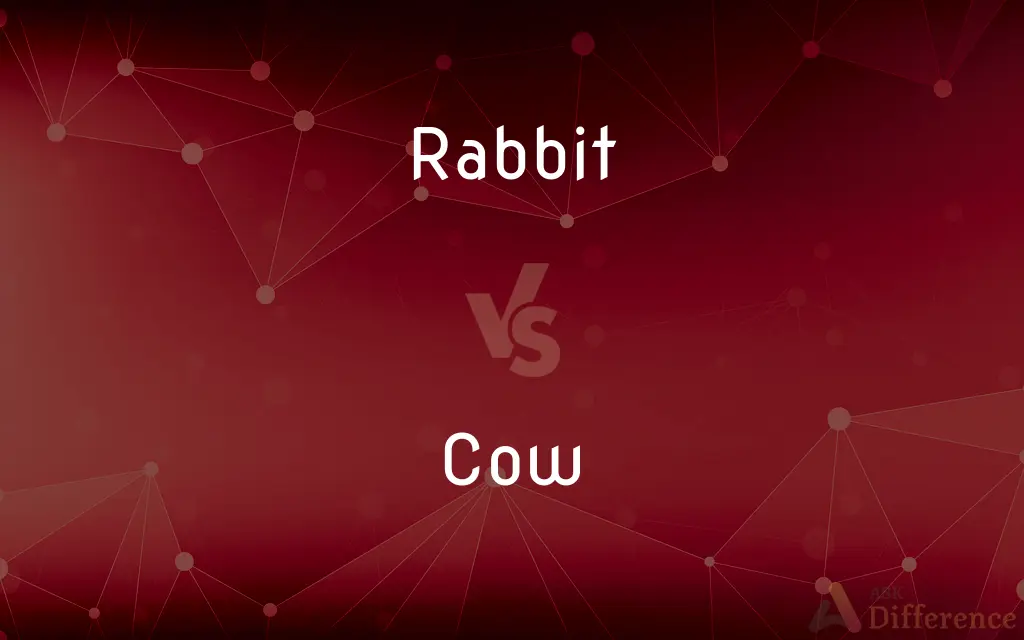Rabbit vs. Cow — What's the Difference?
By Maham Liaqat & Urooj Arif — Updated on April 23, 2024
Rabbits are small, herbivorous mammals known for their large ears and quick breeding, while cows are larger, domesticated animals valued for milk, meat, and labor.

Difference Between Rabbit and Cow
Table of Contents
ADVERTISEMENT
Key Differences
Rabbits, typically weighing between 2 to 4 kg, are much smaller than cows, which can weigh anywhere from 450 to 1350 kg. This significant difference in size affects their dietary needs and habitat requirements.
While rabbits have a diet primarily consisting of grass, leafy weeds, and forbs, cows consume larger quantities of grass, hay, and sometimes grains, reflecting their larger size and different digestive systems.
Rabbits are known for their exceptional reproductive abilities, often having multiple litters of 4 to 12 kits per year, whereas cows have a longer reproductive cycle, usually birthing one calf per year.
In terms of habitat, rabbits are adaptable and can thrive in various environments, from forests to grasslands; cows, on the other hand, are typically raised in more controlled settings like pastures or barns to optimize milk production and health.
Social structures also differ; rabbits can be either solitary or live in small groups, depending on the species, while cows are inherently social animals, often found in herds which improves their security and social learning.
ADVERTISEMENT
Comparison Chart
Size
Small (2-4 kg)
Large (450-1350 kg)
Diet
Grass, leafy weeds, forbs
Grass, hay, grains (in farm settings)
Reproductive Rate
High (multiple litters per year)
Lower (one calf per year)
Habitat
Forests, grasslands, urban areas
Pastures, barns
Social Structure
Solitary or small groups
Social, lives in herds
Compare with Definitions
Rabbit
A small mammal with long ears, known for its speed and agility.
The rabbit darted across the field when it heard a noise.
Cow
Subject to breeding controls to enhance traits.
The farm breeds cows selectively to increase milk yield.
Rabbit
Herbivore that feeds on grass and leafy plants.
Rabbits can often be seen nibbling grass in the meadows.
Cow
A large domesticated animal raised for milk, meat, or labor.
The cow grazed peacefully in the pasture.
Rabbit
Known for its prolific breeding capabilities.
The rabbit population in the area has increased rapidly.
Cow
Social animal that thrives in herd environments.
Cows often huddle together for warmth during cold nights.
Rabbit
Generally a prey animal in ecosystems.
Rabbits are crucial for the survival of many predators in the forest.
Cow
Herbivore that consumes a large quantity of fodder.
The cow needs daily feeding of fresh hay and grains.
Rabbit
Possesses strong hind legs used for leaping.
The rabbit used its hind legs to leap over the log.
Cow
Important in agricultural settings for dairy production.
The dairy farm housed over fifty cows for milk production.
Rabbit
Any of various long-eared, short-tailed, burrowing mammals of the family Leporidae, such as the commonly domesticated species Oryctolagus cuniculus, native to Europe and widely introduced elsewhere, or the cottontail of the Americas.
Cow
The mature female of cattle of the genus Bos.
Rabbit
A hare.
Cow
The mature female of certain other large animals, such as elephants, moose, or whales.
Rabbit
The flesh of a rabbit, used as food.
Cow
To frighten or subdue with threats or a show of force.
Rabbit
The fur of a rabbit or hare.
Cow
An adult female of the species Bos taurus, especially one that has calved.
Cow milk is the most common form of milk in Europe.
Rabbit
A competitor who is designated to set a fast pace for a teammate during a long-distance race.
Cow
(uncommon) Beef: the meat of cattle as food.
The only meat I eat is cow.
Rabbit
A racehorse that is run at a fast pace early in a race in order to tire the favorite so that another horse can take the lead.
Cow
(uncommon) Any bovines or bovids generally, including yaks, buffalo, etc.
Rabbit
A mechanical decoy that is propelled around the track in a greyhound race to incite the dogs.
Cow
(biology) A female member of other large species of mammal, including the bovines, moose, whales, seals, hippos, rhinos, manatees, and elephants.
Rabbit
To hunt rabbits or hares.
Cow
A woman considered unpleasant in some way, particularly one considered nasty, stupid, fat, lazy, or difficult.
Rabbit
A mammal of the family Leporidae, with long ears, long hind legs and a short, fluffy tail.
The pioneers survived by eating the small game they could get: rabbits, squirrels and occasionally a raccoon.
Cow
(mining) A chock: a wedge or brake used to stop a machine or car.
Rabbit
(uncountable) The meat from this animal.
Cow
To intimidate; to daunt the spirits or courage of.
Con artists are not cowed by the law.
Rabbit
(uncountable) The fur of a rabbit typically used to imitate another animal's fur.
Cow
The mature female of bovine animals.
Rabbit
A runner in a distance race whose goal is mainly to set the pace, either to tire a specific rival so that a teammate can win or to help another break a record; a pacesetter.
Cow
The female of certain large mammals, as whales, seals, etc.
Rabbit
(cricket) A very poor batsman; selected as a bowler or wicket-keeper.
Cow
A chimney cap; a cowl
Rabbit
(comptheory) A large element at the beginning of a list of items to be bubble sorted, and thus tending to be quickly swapped into its correct position. Compare turtle.
Cow
A wedge, or brake, to check the motion of a machine or car; a chock.
Rabbit
Rarebit; Welsh rabbit or a similar dish: melted cheese served atop toast.
Cow
To depress with fear; to daunt the spirits or courage of; to overawe.
To vanquish a people already cowed.
THe French king was cowed.
Rabbit
A pneumatically-controlled tool used to insert small samples of material inside the core of a nuclear reactor.
Cow
Female of domestic cattle:
`moo-cow' is a child's term
Rabbit
(intransitive) To hunt rabbits.
Cow
Mature female of mammals of which the male is called `bull'
Rabbit
To flee.
The informant seemed skittish, as if he was about to rabbit.
When the three friends heard someone behind them yell, "police, freeze!" they each rabbited in a different direction.
Cow
A large unpleasant woman
Rabbit
To talk incessantly and in a childish manner; to babble annoyingly.
Rabbit on
Stop your infernal rabbiting! Use proper words or nobody will listen to you!
Cow
Subdue, restrain, or overcome by affecting with a feeling of awe; frighten (as with threats)
Rabbit
Confound; damn; drat.
Rabbit
Any of the smaller species of the genus Lepus, especially the common European species (Lepus cuniculus), which is often kept as a pet, and has been introduced into many countries. It is remarkably prolific, and has become a pest in some parts of Australia and New Zealand.
Rabbit
Any of various burrowing animals of the family Leporidae having long ears and short tails; some domesticated and raised for pets or food
Rabbit
The fur of a rabbit
Rabbit
Flesh of any of various rabbits or hares (wild or domesticated) eaten as food
Rabbit
Hunt rabbits
Common Curiosities
In what types of habitats do rabbits and cows typically live?
Rabbits are adaptable, living in environments such as forests, grasslands, and even urban areas. Cows are mostly raised in controlled agricultural settings like pastures or barns.
What are the main dietary differences between a rabbit and a cow?
Rabbits primarily eat grass, leafy weeds, and forbs. Cows consume a more varied diet including grass, hay, and grains, tailored to their nutritional needs and larger size.
How does the reproductive rate differ between rabbits and cows?
Rabbits have a high reproductive rate, often producing multiple litters per year, each containing several kits. Cows generally have a slower reproductive cycle, typically birthing one calf per year.
Why are rabbits considered prey animals while cows are usually domesticated?
Rabbits are small and vulnerable, making them prey for a variety of predators, whereas cows, being large and often kept in human-controlled environments, are mainly raised for agriculture rather than being targeted by natural predators.
What is the average weight of a rabbit compared to a cow?
The average rabbit weighs between 2 to 4 kg, while cows typically weigh between 450 to 1350 kg, depending on the breed and age.
How do the lifespans of rabbits and cows compare?
Domestic rabbits typically live around 8 to 12 years, whereas cows can live 15 to 20 years under good care in a farm setting.
How do the social structures of rabbits and cows differ?
Rabbits can be solitary or live in small groups, depending on the species. Cows are inherently social animals and usually live in herds, which helps them with social learning and protection.
What role do rabbits and cows play in their respective ecosystems?
Rabbits can help control plant growth and serve as prey in their ecosystems, while cows, primarily raised in agricultural settings, impact the environment through grazing and as part of the food production system.
How are rabbits and cows typically utilized in human culture and industry?
Rabbits are used for meat, fur, and as pets, contributing to various cultural practices and industries. Cows are integral to agriculture for meat, milk, and leather production, and they also play roles in cultural and religious ceremonies in many societies.
How do rabbits affect their environment versus cows?
Rabbits can significantly impact vegetation due to their feeding habits and burrowing, leading to soil erosion in some cases. Cows, being larger, can affect the land through grazing pressure, trampling, and methane production.
Can rabbits be raised in the same way as cows for agricultural purposes?
While both can be raised agriculturally, they are typically bred and managed differently due to their differing sizes, dietary needs, and roles in farming (e.g., milk and meat production for cows, meat and fur for rabbits).
What are the benefits of raising rabbits over cows?
Rabbits require less space, reproduce quickly, and can convert feed to meat more efficiently than cows, making them suitable for smaller farms or less resource-intensive agriculture.
Are there specific breeds of rabbits like there are for cows?
Yes, there are numerous breeds of rabbits, ranging from the tiny Netherland Dwarf to the large Flemish Giant, each with unique characteristics, just as there are various cow breeds like Holstein, Angus, and Jersey.
How does the gestation period of a cow compare to a rabbit's?
The gestation period for a cow is about 280 days, while for rabbits, it is much shorter, approximately 30 days.
What are common diseases that can affect rabbits and cows?
Rabbits are prone to diseases like myxomatosis and RHD (Rabbit Hemorrhagic Disease), while cows can suffer from conditions like mastitis, BSE (mad cow disease), and foot-and-mouth disease.
Share Your Discovery

Previous Comparison
Gazelle vs. Antelope
Next Comparison
Lait vs. FlashAuthor Spotlight
Written by
Maham LiaqatCo-written by
Urooj ArifUrooj is a skilled content writer at Ask Difference, known for her exceptional ability to simplify complex topics into engaging and informative content. With a passion for research and a flair for clear, concise writing, she consistently delivers articles that resonate with our diverse audience.















































